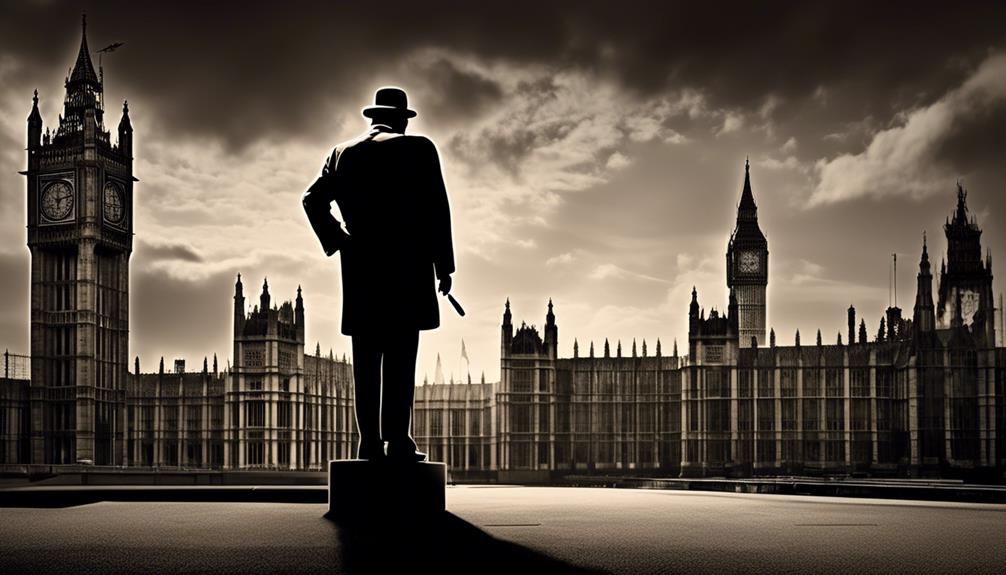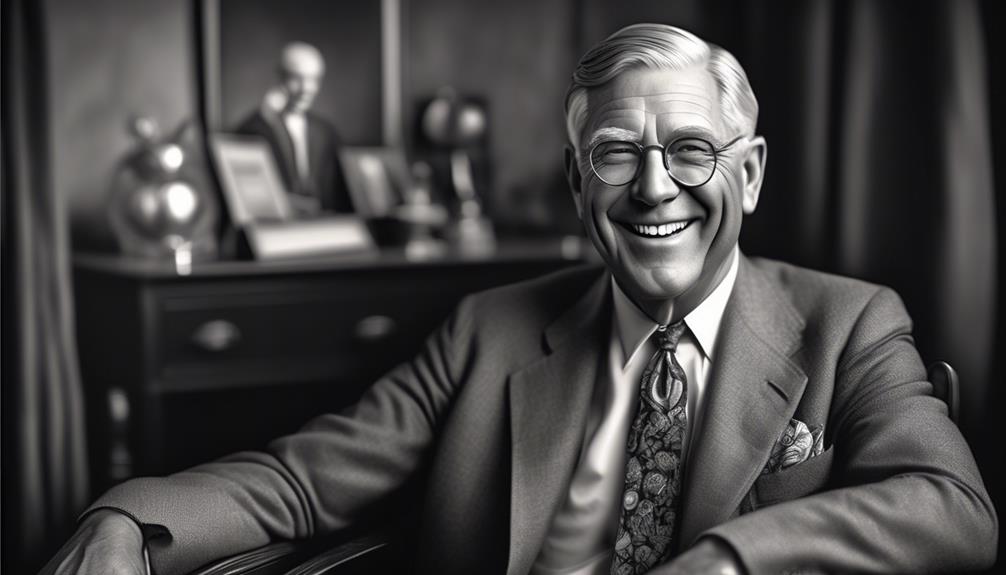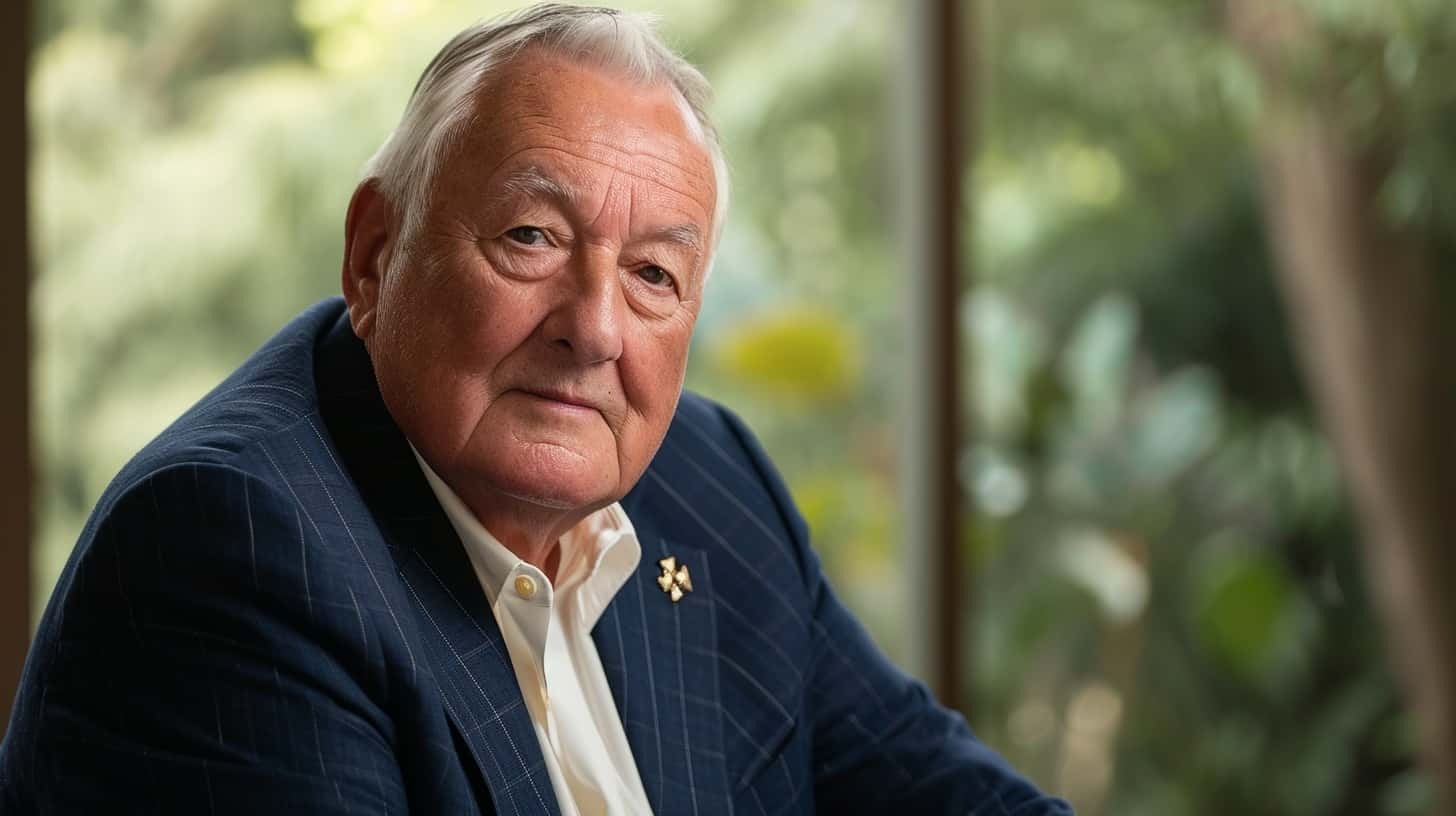Without overstating, it’s fair to claim that Winston Churchill ranks among the most pivotal figures in the annals of British history.
As a beloved British politician and former Prime Minister of the United Kingdom, Churchill's impact on the world is immeasurable. His leadership during World War II, coupled with his remarkable oratory skills, made him a beacon of hope in a time of darkness.
Churchill's quotes have become timeless gems, offering wisdom and inspiration to people from all walks of life. From his views on democracy to his thoughts on success, determination, adversity, and unity, Churchill's words continue to resonate with us today.
Join us as we delve into the profound insights and enduring legacy of Winston Churchill's quotes.
Key Takeaways
- Churchill's privileged upbringing and education provided him with the knowledge and skills necessary for his future endeavors in politics.
- Churchill's leadership during World War II showcased his strategic vision, inspirational communication, and decisive action, leading to the Allied victory.
- Churchill's famous speeches and addresses were known for their eloquence and impact, inspiring and rallying the British people during difficult times.
- Churchill's legacy as a leader is one of courage, success, and determination, reminding us of the importance of collaboration and unity for a common purpose.
Early Life and Education
During his early years, Winston Churchill demonstrated a keen intellect and a thirst for knowledge that would shape his future as a prominent figure in British history. His early life was marked by a privileged upbringing and a strong education. Churchill was born into a wealthy family, which allowed him access to the best schools and tutors. He attended Harrow School and later, the Royal Military College in Sandhurst.
Education played a pivotal role in Churchill's life, as it equipped him with the knowledge and skills needed to excel in his future endeavors. His education laid the foundation for his entry into politics, where he quickly rose through the ranks. Churchill's leadership during World War II is well-documented and admired. His famous speeches, such as the 'We Shall Fight on the Beaches' speech, showcased his unwavering determination and inspired the British people in their darkest hours.
Churchill's views on democracy were shaped by his experiences and beliefs. He believed in the power of a democratic system and its ability to safeguard individual freedoms. His wit and humor were also evident in his speeches and interactions with others.
Churchill's legacy as a leader is one of courage, success, and determination. His quotes on courage, success, determination, adversity, and unity continue to inspire people around the world. Churchill's belief in the power of collaboration and unity resonates even today, reminding us of the importance of working together for a common purpose.
Entry Into Politics
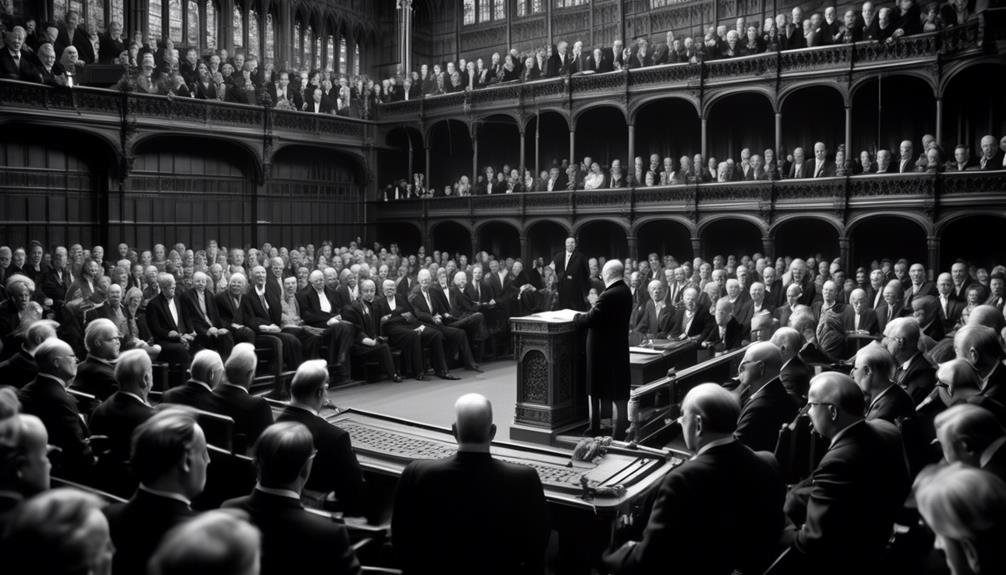
After receiving a well-rounded education, Churchill's intellect and thirst for knowledge led him to embark on a new journey in his life: his entry into politics. Churchill's political career began in 1900, when he successfully ran for a seat in the House of Commons as a member of the Conservative Party. This marked the beginning of a long and influential career in British politics.
Churchill quickly established himself as a talented and charismatic politician, known for his eloquence and strong leadership skills. He held various ministerial positions, including President of the Board of Trade and Home Secretary, before serving as First Lord of the Admiralty during World War I. However, it was during World War II that Churchill truly came to the forefront of British politics, as he led the country through one of its darkest periods with his unwavering determination and inspiring speeches.
Throughout his political career, Churchill was known for his firm beliefs and unwavering commitment to his principles. He was a staunch advocate for democracy, freedom, and the British Empire. His entry into politics marked the beginning of a remarkable journey that would see him become one of the most influential figures in British history.
Leadership During World War II
Churchill's leadership during World War II propelled him to the forefront of British politics and solidified his status as one of the most influential figures in history. His leadership strategies and military tactics played a crucial role in guiding the Allies to victory. Here are three key elements of Churchill's leadership during this tumultuous period:
- Strategic Vision: Churchill possessed a remarkable ability to see the bigger picture and understand the long-term implications of military decisions. He recognized the importance of a united front against Nazi Germany and tirelessly advocated for the formation of alliances, such as the Allied Powers, to combat the Axis forces.
- Inspirational Communication: Churchill's powerful speeches and unwavering resolve inspired a nation facing great adversity. His famous 'We shall fight on the beaches' speech rallied the British people and instilled in them a sense of determination and resilience.
- Decisive Action: Churchill was known for his decisive decision-making, often taking bold risks when necessary. He understood the importance of seizing opportunities and acted swiftly, such as during the evacuation of Dunkirk, which saved the lives of thousands of Allied soldiers.
Churchill's leadership during World War II showcased his ability to formulate effective strategies, inspire others, and make tough decisions, ultimately leading to the Allied victory. His legacy as a great leader continues to inspire and influence leaders around the world.
Famous Speeches and Addresses

One of the defining aspects of Winston Churchill's leadership was his ability to deliver powerful and influential speeches. He was known for his masterful oratory skills, which played a crucial role in inspiring and rallying the British people during some of their darkest hours. Churchill's historical speeches are still celebrated today for their eloquence and impact. Here is a table showcasing some of his most famous speeches and addresses:
| Speech/Address | Date | Context/Significance |
|---|---|---|
| "We Shall Fight on the Beaches" | June 4, 1940 | Churchill rallied the British people during the Dunkirk evacuation, urging them to persevere in the face of Nazi aggression. |
| "Blood, Toil, Tears, and Sweat" | May 13, 1940 | This speech marked Churchill's first address as Prime Minister, where he prepared the nation for the hardships of war and called for unity and determination. |
| "The Finest Hour" | June 18, 1940 | In this speech, Churchill praised the resilience of the British people and expressed confidence in their ability to overcome the German onslaught. |
| "Their Finest Hour" | June 18, 1940 | Churchill emphasized the importance of British resolve and outlined his strategy for victory against Nazi Germany. |
These speeches, among many others, showcased Churchill's ability to inspire and motivate his audience. His words not only instilled hope and determination in the British people but also rallied support from their allies. Churchill's speeches have stood the test of time and continue to be studied and admired for their powerful rhetoric and historical significance.
Churchill's Views on Democracy
During his time as a leader, Winston Churchill's speeches not only rallied the British people, but also revealed his profound views on democracy. Churchill believed in the importance of public opinion and recognized that the strength of a democracy lies in the active participation of its citizens. Here are some key aspects of Churchill's views on democracy:
- Respect for public opinion: Churchill understood that democracy thrives when the government respects and values the opinions of its citizens. He believed that the voice of the people should guide political decision-making.
- Freedom of expression: Churchill staunchly defended the freedom of speech and expression, recognizing that a healthy democracy requires an open exchange of ideas. He believed that individuals should have the right to express their opinions without fear of retribution.
- Responsibility of leaders: Churchill believed that leaders have a responsibility to represent the interests of the people and work towards the betterment of society. He emphasized the need for leaders to be accountable and transparent in their actions.
Churchill's views on democracy highlight the importance of public participation, freedom of expression, and responsible leadership. His insights continue to inspire and guide political discourse to this day.
Churchill's Wit and Humor
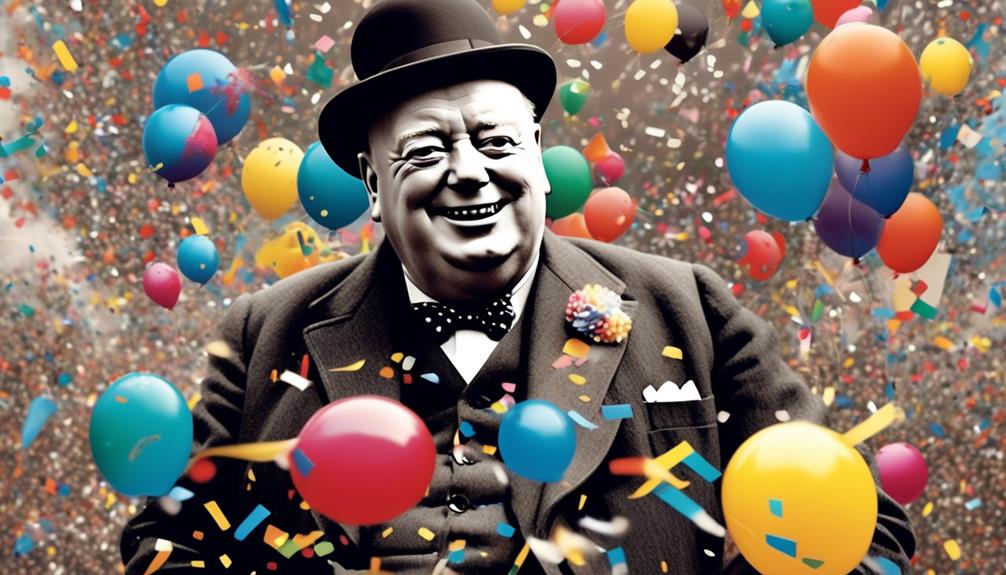
Known for his quick wit and sharp sense of humor, Winston Churchill's ability to cleverly articulate his thoughts and observations added an entertaining element to his speeches and interactions with others. Churchill's wit and humor were evident in his speeches, often using clever wordplay and humorous anecdotes to engage his audience.
One example of Churchill's wit can be seen in his famous response to Lady Astor, the first female Member of Parliament. During a heated debate, Lady Astor told Churchill, 'If you were my husband, I'd poison your tea.' Without missing a beat, Churchill replied, 'Madam, if I were your husband, I'd drink it.'
Churchill's sense of humor extended beyond his verbal exchanges. He often used self-deprecating humor to lighten the mood and connect with his audience. For instance, when asked about his political rival, Clement Attlee, Churchill quipped, 'He is a modest man, with much to be modest about.'
In addition to his wit, Churchill was also known for using humor to diffuse tension and boost morale during World War II. His famous line, 'I have nothing to offer but blood, toil, tears, and sweat,' showed his ability to use humor to rally the British people in the face of adversity.
Legacy as a Leader
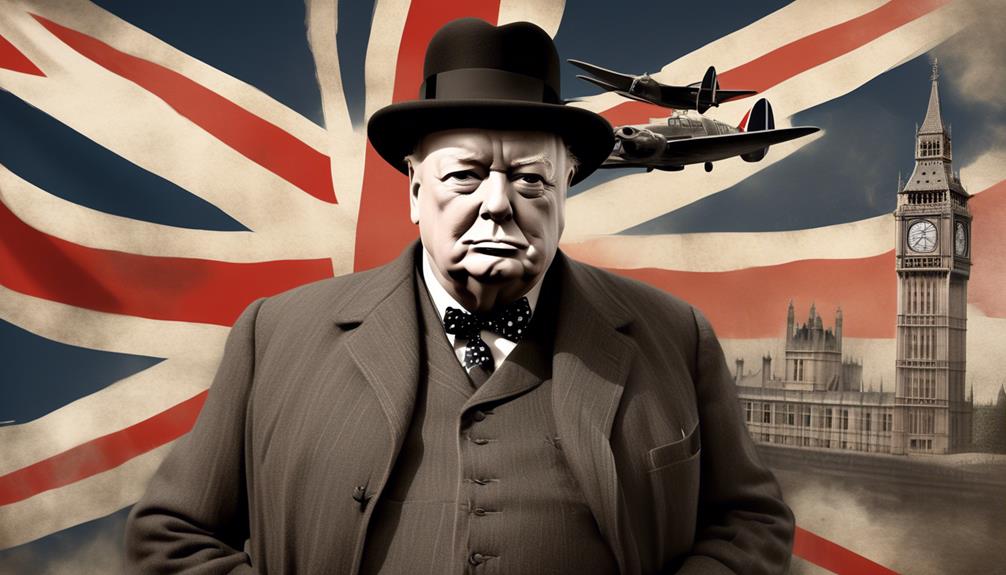
Having demonstrated his wit and humor throughout his speeches and interactions, Winston Churchill's legacy as a leader extends far beyond his ability to entertain and engage his audience. His leadership style was characterized by resilience, determination, and strategic thinking, which had a profound impact on history.
- Resilience: Churchill's unwavering determination during World War II inspired his country and allies to persevere in the face of immense challenges. His famous quote, 'Never give in, never give in, never, never, never, never,' exemplifies his indomitable spirit and refusal to surrender.
- Determination: Churchill's unwavering commitment to defending democracy and freedom led him to make tough decisions, such as mobilizing the British military and forming strong alliances to counter Nazi aggression. His steadfastness and resolve played a crucial role in shaping the outcome of the war.
- Strategic Thinking: Churchill's ability to think strategically and anticipate future challenges allowed him to effectively lead his country through a time of crisis. His foresight in recognizing the threat posed by Hitler's Germany and his insistence on preparing for war were key factors in Britain's eventual victory.
Churchill's leadership style and impact on history make him an iconic figure who continues to inspire leaders today. His legacy serves as a reminder of the power of resilience, determination, and strategic thinking in the face of adversity.
Churchill's Quotes on Courage
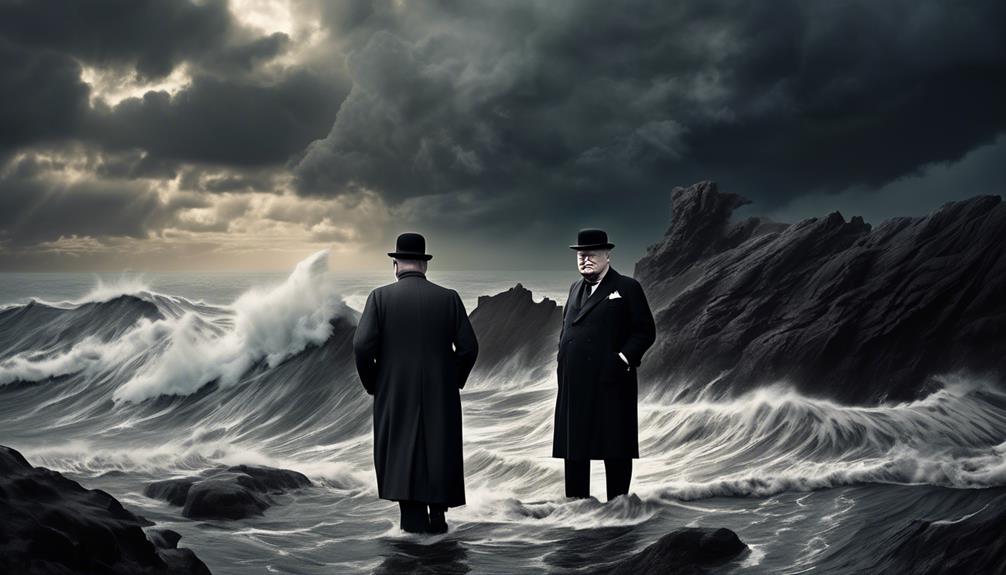
Churchill's quotes on courage reflect his unwavering conviction and serve as a testament to his belief in the power of bravery in the face of adversity. Throughout his life, Churchill demonstrated immense courage in leadership, making tough decisions and facing fears head-on.
One of his most famous quotes on courage highlights this trait: 'Success isn't final, failure isn't fatal: It's the courage to continue that counts.' This quote encapsulates Churchill's understanding that courage isn't about achieving immediate success or avoiding failure, but rather about having the strength to persevere even in the face of setbacks.
Another quote that showcases Churchill's perspective on courage is: 'Courage is what it takes to stand up and speak; courage is also what it takes to sit down and listen.' This quote emphasizes the importance of having the courage to voice one's opinions and take action, but also the courage to listen and learn from others. It reflects Churchill's belief in the power of open dialogue and the ability to consider different perspectives.
In his speeches and writings, Churchill often encouraged others to embrace courage and face their fears. He believed that courage was essential not only for leaders but for individuals in all walks of life. His quotes on courage continue to inspire people to overcome challenges and demonstrate bravery in the face of adversity.
Churchill's Quotes on Success

After exploring Churchill's quotes on courage, we now turn our attention to his insightful words on achieving success. Churchill's quotes on success provide valuable insights into the success mindset and achieving goals. Here are three of his most powerful quotes:
- 'Success isn't final, failure isn't fatal: It's the courage to continue that counts.' This quote emphasizes the importance of persistence and resilience in the face of setbacks. It reminds us that success isn't a destination but a continuous journey.
- 'Success consists of going from failure to failure without loss of enthusiasm.' Churchill's words highlight the need to maintain a positive attitude and unwavering enthusiasm, even in the face of failures. It emphasizes the importance of learning from mistakes and using them as stepping stones towards success.
- 'Continuous effort – not strength or intelligence – is the key to unlocking our potential.' This quote emphasizes the importance of hard work and consistent effort in achieving our goals. It reminds us that success isn't solely determined by natural talents or abilities, but by the dedication and perseverance we put into our endeavors.
Churchill's quotes on success serve as timeless reminders of the mindset and actions required to achieve our goals. They inspire us to stay resilient, enthusiastic, and committed to our pursuit of success.
Churchill's Quotes on Determination

To gain insight into Churchill's unwavering determination, we can turn to his powerful quotes that illustrate the importance of resilience and perseverance in the face of challenges. Churchill's quotes on determination serve as a testament to his unwavering spirit and his ability to overcome obstacles in difficult times.
One of Churchill's famous quotes on determination is, 'Success isn't final, failure isn't fatal: It's the courage to continue that counts.' This quote highlights the importance of perseverance and resilience in the face of failure. Churchill believed that setbacks shouldn't deter one from pursuing their goals, but rather should serve as motivation to keep going.
Another powerful quote by Churchill is, 'Continuous effort – not strength or intelligence – is the key to unlocking our potential.' This quote emphasizes the importance of determination and hard work. Churchill believed that it's through relentless effort and perseverance that we can reach our full potential and achieve success.
In challenging times, Churchill's quote, 'If you're going through hell, keep going,' encapsulates his unwavering determination. This quote reminds us that in difficult circumstances, the key is to keep pushing forward and not give up.
Churchill's Quotes on Adversity

When faced with adversity, Winston Churchill's quotes offer valuable insight and inspiration. Churchill's quotes on resilience and overcoming challenges are particularly relevant in times of difficulty. Here are three of his quotes that encapsulate his wisdom on this subject:
- 'Success isn't final, failure isn't fatal: It's the courage to continue that counts.' This quote highlights Churchill's belief in the importance of perseverance and resilience. He understood that setbacks and failures are a natural part of life, but it's the ability to keep going despite these obstacles that truly matters.
- 'The pessimist sees difficulty in every opportunity. The optimist sees opportunity in every difficulty.' Churchill's words remind us to adopt a positive mindset in the face of adversity. He believed that challenges present opportunities for growth and innovation, and it's our perspective that determines how we navigate through them.
- 'If you're going through hell, keep going.' This quote reflects Churchill's determination to never give up, even in the most challenging circumstances. He understood that the only way to overcome adversity is to keep moving forward, no matter how difficult the journey may be.
Churchill's quotes on resilience and overcoming challenges serve as a reminder that it's our attitude and perseverance that ultimately determine our success in the face of adversity.
Churchill's Quotes on Unity and Collaboration
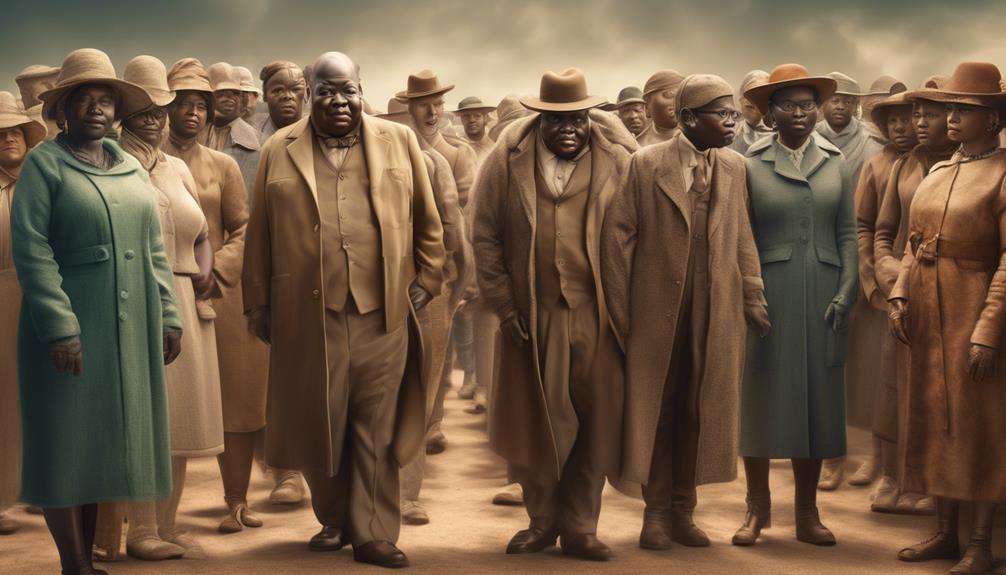
Churchill's quotes on unity and collaboration emphasize the importance of working together towards a common goal. He recognized that unity and teamwork are essential for progress and success. Churchill believed that collaboration allows individuals to pool their strengths and resources, leading to greater achievements. One of his famous quotes is, "We are all worms, but I do believe that I am a glowworm." This quote highlights the idea that while individuals may be insignificant on their own, when they come together and collaborate, they can shine brightly and make a significant impact.
Churchill's emphasis on unity and collaboration is evident in his leadership style during World War II. He formed alliances with other countries, such as the United States and the Soviet Union, to fight against the Axis powers. By working together, these nations were able to achieve significant progress and ultimately secure victory.
To further illustrate Churchill's views on unity and collaboration, let us examine the following table:
| Quote | Meaning |
|---|---|
| "If we are together, nothing is impossible." | Unity allows us to overcome any obstacle. |
| "The price of greatness is responsibility over each of your comrades." | Collaboration requires everyone to take responsibility for the group's success. |
| "We make a living by what we get, but we make a life by what we give." | Collaboration is not just about achieving personal gain but also about contributing to the greater good. |
| "We shape our buildings; thereafter, they shape us." | Collaboration in designing and building structures influences our behavior and interactions within them. |
Frequently Asked Questions
What Was Winston Churchill's Favorite Hobby During His Early Life and Education?
During his early life and education, Winston Churchill's favorite hobby was painting. He found solace and relaxation in art, often immersing himself in creating landscapes and portraits.
Churchill's family background, with a mother who was a talented artist, greatly influenced his passion for painting. This hobby not only provided him with a creative outlet, but also served as a means of escape from the pressures of his political career.
How Did Winston Churchill's Family Background Influence His Entry Into Politics?
How did Winston Churchill's family background influence his entry into politics?
Family influences play a significant role in shaping one's career choices. In Churchill's case, his family's long history of political involvement and public service served as a strong foundation for his entry into politics.
Growing up surrounded by influential figures and immersed in discussions of national affairs, it was only natural for Churchill to follow in his family's footsteps. His upbringing provided him with the necessary knowledge, connections, and ambition to pursue a successful political career.
What Were Some of the Challenges Churchill Faced During His Leadership During World War Ii?
During his leadership during World War II, Winston Churchill faced numerous challenges. He had to navigate the complexities of coordinating military strategies with Allied leaders, manage the morale of the British people, and make crucial decisions that would impact the outcome of the war.
Additionally, Churchill had to deal with the immense pressure of leading a nation through a global conflict, while also facing criticism and opposition from political rivals. Despite these challenges, Churchill's strong leadership and determination played a pivotal role in the eventual victory of the Allied forces.
Did Churchill Ever Regret Any of His Famous Speeches and Addresses?
Did Churchill ever regret any of his famous speeches and addresses?
At times, we wonder if the eloquent words that flowed from his lips ever caused him to feel a pang of regret.
While Churchill's speeches and addresses have become legendary, it's possible that he may have questioned the impact or consequences of some of his words.
As a leader, it's natural to reflect on the power and influence of one's rhetoric, and Churchill, with his deep understanding of the weight of words, may have experienced moments of introspection and self-doubt.
How Did Churchill's Views on Democracy Evolve Over Time?
Over time, Churchill's views on democracy underwent an evolution. His early political career saw him as a conservative who believed in the importance of strong leadership. However, as he witnessed the rise of fascism and the atrocities committed during World War II, Churchill's democratic ideology grew stronger.
He became a staunch advocate for individual freedoms and the power of the people. His impact on democratic values is undeniable, as his leadership and unwavering commitment to democracy inspired many around the world.
Conclusion
In conclusion, Winston Churchill's quotes serve as a timeless reminder of his leadership qualities and enduring spirit. Like a beacon of hope in times of darkness, his words inspire us to persevere, unite, and strive for success.
Churchill's remarkable ability to navigate through adversity and his unwavering determination continue to resonate with audiences around the world. His belief in the power of democracy and the importance of collaboration reminds us of the strength that can be found in unity.
